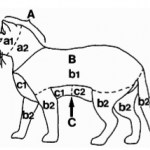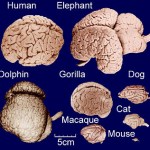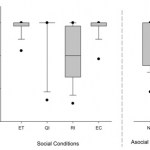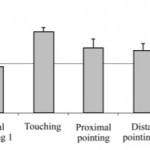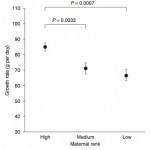mammals
In March 2000, Dr. Simon Chapman and colleagues from the University of Sydney published a paper in which they assessed the effectiveness of an educational intervention for the prevention of dog bites in children.
"Prevent-a-Bite" is an educational programme designed for primary school children. The programme aims to instill precautionary behaviour around dogs, assuming that this might reduce the incidence of attacks. A randomised controlled trial of the efficacy of the intervention was conducted in Australian children aged 7-8 years who were presented with an unsupervised opportunity to…
Non-human primate, that is.
Ape actor Peter Elliott shares his knowledge of chimpanzee and gorilla vocabulary and facial expressions.
via IMDb:
Peter Elliott is the film industry's primary primate. He both as a performer, in films like Missing Link and The Island of Doctor Moreau, and as a choreographer of other performers, as in Gorillas in the Mist and Congo. He also teaches animal study at London's Central School of Speech and Drama.
Does Fido see the cup as half full? Is your dog pessimistic? Last time we saw headlines like these they were about a certain barnyard animal. Remember "Pampered pigs 'feel optimistic'"? I didn't like it then, and I don't like it now.
Roughly half of the population of dogs in the UK are likely to - at some point in their lives - exhibit "undesirable separation-related behavior (SRB)." These are things that sometimes happen when left alone, like barking, chewing up or otherwise destroying objects, and urinating (or worse!) inside the house. While some owners view these behaviors as fine and…
Or, when the hunting season is closed, watch teh game (the guys), or when there are no sales, admire each other's shoes (the gals)?
This is, of course, a parody of the sociobiological, or in modern parlance, the "evolutionary psychology" argument linking behaviors that evolved in our species during the long slog known as The Pleistocene with today's behavior in the modern predator-free food-rich world. And, it is a very sound argument. If, by "sound" you mean "sounds good unless you listen really hard."
I list this argument among the falsehoods, but really, this is a category of argument…
This one is worth watching all the way through:
(h/t Sara)
And, from the sublime to the mundane:
(h/t Dr. Kiki)
I showed this video today as an intro to my 8-week "mini-course" on Canine Cognition.
In it, narrator John Lithgow presents two slightly different versions of the dog domestication story. The first version is essentially the Belyaev story: young wolves would be adopted into the camps of early humans. Only those who were most tame would breed with eachother, and over many generations, the domestic dog would emerge. The second is the version in which wolves "chose" to be domesticated - they noticed a lot of tasty trash around human encampments, and if they were unafraid enough to hang around,…
Whether you're a dog, a cat, or a grad student who hasn't been home to shower for a few days, fleas are a major problem. They make skin itch. And NOTHING is worse than itchy skin.
But...
Do you know WHERE the fleas are? Where they like to hang out and guard their little flea eggs? Where's the best place for a flea to get a decent night's sleep, or a delicious snack? These are important questions. Lucky for us, Hsu, Hsu, and Wu of the Department of Entomology at National Taiwan University have the answers. And this paper, dear readers, is pure blogging GOLD.
Now, if you wanted to find out…
The National Institutes of Health announced that by 2011 it will transfer almost two hundred chimpanzees from the Alamogordo Primate Facility in New Mexico to a lab in San Antonio, Texas, lab for use in invasive research. In 1995, the NIH announced a moratorium on the breeding of chimps in federally-supported labs, and as a result, scientists have developed alternative ways to investigate diseases. But there are still viruses, such as hepatitis C and HIV, that other species simply can't contract. This fact, some argue, makes it prudent to subject chimps to this sort of biomedical testing.…
via Voice of America News blog:
Organizers of the Commonwealth Games in India say they will try to prevent wild monkeys from disrupting the event by deploying a team of larger, fiercer monkeys to scare off their smaller cousins.
Indian security officials put 10 langur monkeys and their handlers on duty Wednesday at several venues around New Delhi, the host city, to keep wild monkeys in check. More langurs will be deployed when the Commonwealth Games open on Sunday.
Some participating nations have expressed concern about the threat of wild monkeys, dogs and snakes attacking athletes and…
Your humble narrator finds himself sick with a cold, so here's a post from the archives.
There is considerable research on how children interact with other children and with adults, and how child development can be influenced by those interactions. But research on children's interactions with non-human animals seem to be limited. Given how ubiquitous pets are in the homes of children (at least, in WEIRD cultures), it is somewhat surprising that there hasn't been more work on the way pet ownership might affect child development.
According to the US Humane Society:
There are approximately 77…
Cooperation and conflict are both a part of human society. While a good deal of the academic literature addresses the evolutionary origins of conflict, in recent years there has been an increased focus on the investigation of the evolutionary origins of cooperative behavior. One component of cooperative behavior that might be present in other animals is aversion to inequity. Some scientists have suggested that inequity aversion may itself be the main factor driving the enforcement of cooperation. Put simply, inequity aversion is the resistance among partners to unequal rewards following…
At least one dog can be found in forty percent of US households, and forty percent of those owners allow their dogs to sleep on their beds. To put this in perspective, in a family with five children, two of them can be expected to become dog owners, and one of them will probably allow the dog to sleep on his or her bed. In an undergraduate lecture class of two hundred, eighty of those students come from homes with at least one pet dog. So as you might expect, dogs are a big business! In 2007, the pet industry was worth about $40 billion in the US, with dogs responsible for the largest share…
New-born twin giant pandas made their media debut at a zoo in Japan on Friday. The twins, one male and one female, were born on August 11 to mother Rauhin and father Eimei, by artificial insemination. (video via BBC News)
For today's dose of monday pet blogging, head on over to a piece that I wrote for Scientific American that went up today. I used the invitation as an opportunity to a dig a little deeper into the story of Belyaev and his domesticated silver foxes (I previously wrote about them, here and here)
Dogs are pretty smart. They can have huge vocabularies, they can infer meaning in the growls of other dogs, and they can effortlessly figure out if other dogs want to play or fight with them. But their intelligence might be limited to the social domain; indeed, while they outperform chimpanzees in social tasks, chimpanzees outperform them in many other tasks. And they might have developed their impressive social skills as merely an accident of natural and artificial selection.
Previous research has shown that dogs can use lots of different forms of human communicative signals to find food,…
Figure 1: A mother hyena with her cubs.
Early developmental experiences can have significant implications for the growth, behavior, survival, and reproductive success of an individual. In many species, one of the most important factors that affects an individual's early development is the maternal environment. However, mothers not only provide an environment for their offspring, but also half of their genes, making it difficult to separate the effects of nature and nurture when investigating developmental outcomes in the offspring. Moreover, because male mammals usually disperse from the…
A fascinating new paper just came out in Nature Communications and I intend to blog it in the usual manner, but I thought I'd try something new first. Check it out:
The Research Question
...According to life history theory, mothers should invest in their offspring if this enhances offspring survival and fitness, and if the fitness benefit to mothers from increased offspring fitness exceeds the cost of their investment. Whether the maternal environment influences the fitness and reproductive value of sons is unknown in most mammals because male mammals usually disperse and, thus, few studies…
This is the most challenging time of year for duck watching. But it may be easier than one thinks to bump into a wolf in the forest.
We've been exploring the western side of the north-central part of the state, in and around Itasca as far west at Tamarack Wildlife Refuge, where we saw several fine herds of tamarack clustered in the usual low flat areas they prefer.
Duck watching this time of year is very hard. In the beginning of the season the males are in full bloom. Females found near males are almost always of the same species. (Unless the male is a mallard. They do not…
Earlier this week I wrote about the developmental and evolutionary origins of large number representation. A series of studies in human infants, monkeys, rats, and fish demonstrated that animals and humans spontaneously represent large (>4), abstract, approximate numerosities. Animals, human infants, and human adults, show the same ratio signatures (based on Weber's Law). Adult tamarins are on par with 9-month-old human infants. With age or training, discriminability becomes more precise, and the the critical ratio is reduced a bit. There is good evidence that the large number…
This post considering the evolutionary origins of numerical cognition, specifically in terms of the approximation of large numbers, is meant as a companion to this week's series on the developmental origins of numerical cognition and developmental dyscalculia, at Child's Play.
What are the origins of number representation in the mind? Are there any innate building blocks that contribute to our understanding of mathematics and number, or must everything be learned?
Number is an important domain of human knowledge. Many decisions in life are based on quantitative evidence, sometimes with life…



